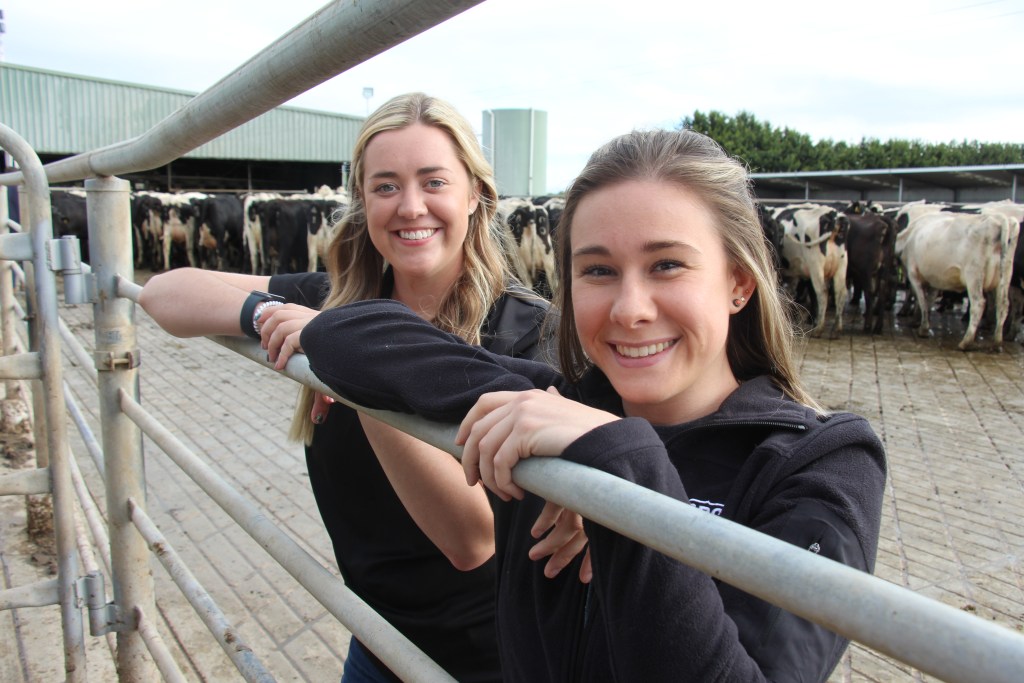US bovine breeding technicians helping Aussie farmers
Two experienced artificial insemination technicians from the United States of America will be breeding cows in Australia this year to help alleviate staff shortages in the sector. And this comes as Australia’s dairy industry prepares to relaunch standardised artificial insemination (AI) training to develop local breeding professionals to service the growing demand.
ABS Global bovine reproduction technicians Lynnsey Crouch and Rebecca Leonard, from the US, have joined the herd improvement team at Nu-Genes in Western Victoria and hit the ground running.

Nu-Genes director Adam Daniel said the industry has been “massively short” of breeding expertise for a long time. “The last couple of years, pre-COVID, we’d been quite short and then we had an idea to approach AI companies asking if they had staff that would be interested,” he said. “It was because the number of corporate farms was increasing and the number of cows on farms was increasing, and we needed more people.”
ABS jumped at the chance to help the Australian dairy industry while also providing valuable on-farm educational opportunities for its global staff. Mr Daniel said adding Lynnsey and Rebecca to the Nu-Genes team should provide farmers with confidence, because they are well-trained and experienced technicians. “It’s about quality assurance, knowing that when someone turns up on farm, they know how to do their job properly,” he said.
ABS Australia general manager Marcus Rees said there had been a “clear need” for more technicians in Australia. “We have access to a skilled labour force in America, so we joined forces with Nu-Genes to bring some technicians out to Australia and help alleviate an industry challenge,” he said. “At this stage there’s no real benefit to ABS, it’s about helping Australian dairy farmers get access to skilled reproduction technicians and getting more cows in calf. In time, we’d love to expand the program and bring more staff from across the globe out to Australia and perhaps send local staff overseas to broaden their skills set and improve their breeding knowledge.”
For Lynnsey and Rebecca, working at Australian dairy farms has provided insight into pasture-based dairy farming. “What I’ve enjoyed the most is the differences every day, inserting CIDRs, needle jobs and also breeding, I like the variety,” Lynnsey said. “Here we’ve been doing a lot of fast breeding – when cows are in a rotary parlour and they are going around, we have to keep up with the pace,” Rebecca added. “In the US, it’s generally a one-person job and we lock cows up in headlocks and breed them individually. But here we are working in teams of five or six. As the cows go around the parlour (rotary), we all rotate positions, breeding and loading AI guns. Sometimes we breed the cows and heifers in the chute or as the Australians call it, a ‘crush’.”
The training and availability of AI technicians in Australia has ebbed and flowed, with droughts and the seasonal nature of the occupation affecting the availability of staff. The industry has long relied on international technicians to support local Australian reproduction teams, even during COVID. AI training was once a formalised education program run by the government and since there’s been various providers without an agreed standard.
National Herd Improvement Association of Australia (NHIA) chairman Graeme Gillan said a member survey up to three years ago identified a shortage of AI technicians, especially with growing interest in artificial insemination in the beef industry, and a need for standardised training. He said the standardised training would be relaunched in the coming months. “There is a huge amount of resources going into TAFE as a starting point for the initial training,” he said. “It will be a stepping-stone for people who wanted to be more serious about it and AI at their home property. The next step will be to develop an accreditation for a professional level.”
Follow Rebecca and Lynnsey’s adventures in Australia via Instagram @absdownunder2022
